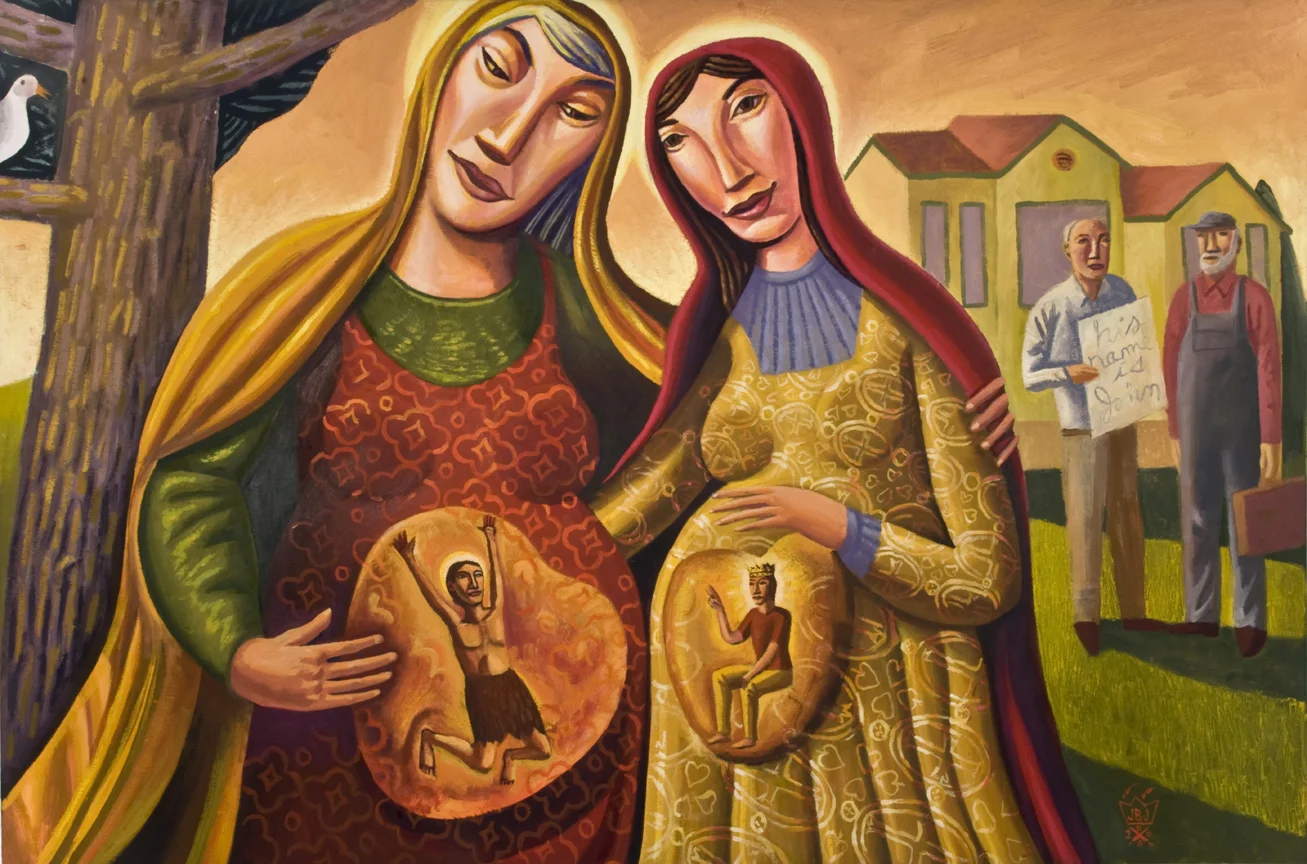This Advent I have been captivated by Elizabeth, the cousin of Mary. I am drawn to her circumstances, but also very much to the wisdom and mystery of her. I know what it is to struggle with infertility and then to be surprised by Life. The other things? The patience, kindness, and strength...they elude me. I have spent this season asking God how to lean into Elizabethness, and the asking brought a delightful gift.
I discovered this painting by James Janknegt aptly titled The Visitation. Every time I look at it I make a new discovery and I find that this story is settling into my bones. The painter describes his work as "contemporary icons," scriptural truth in a modern setting. I asked him if I could interview him for this blog. I wanted to share his work with you. It is my deep pleasure to invite you into my conversation with James Janknegt:
Michelle: Why do you paint?
James Janknegt: I always wanted to be an artist. I feel like being a painter is my vocation. I originally struggled with the idea when I first became a Christian when I was 17. I didn’t know of any contemporary artists who were Christians and I wasn’t sure that being a painter was a valid pursuit. I had a mystical experience while browsing through a Salvador Dali book in a mall bookstore. I opened the book to his painting of St. John of the Cross and I felt God speak to me in that clear, inaudible voice that to be a painter was my vocation. Ever since then I have pursued that with all my heart.
M: Why paint icons?
JJ: I don’t think to be a Christian and an artist one must paint religious work. Any kind of expression of creativity is a participation in the creative work of God. But around 2000 I decided that I would only paint religious work. I think it was a bit like, “If you were going to die and could only paint one painting what would you paint?” I admitted that my faith was the center of my life that everything else revolved around, so why wasn’t I making paintings about that? I mean, it is the “greatest story every told” and I think every generation deserves to have that story told in the vernacular of their own time. So that is what I set out to do: paint religious paintings in the spirit of the great religious painters of the medieval world but in a contemporary way.
“Art is about incarnating ideas, putting flesh and bones on stories.”
M: I think that was what first captured me about this painting, the story is told in the vernacular of my time. The personalities are recognizable but made even more familiar by the setting. I notice that you have several different pieces on the topic of The Visitation. What is it about this event that continues to captivate you?
JJ: The visitation is one of the first powerful windows looking into the incarnation. As soon as Jesus is conceived, Mary goes to her cousin Elizabeth who is already six months pregnant with John. Both John and Elizabeth acknowledge the presence of Jesus as the Messiah, John by jumping in the womb of Elizabeth and Elizabeth by prophesying full of the Holy Spirit, “Blessed are you among women, and blessed is the fruit of your womb. And why has this happened to me, that the mother of my Lord comes to me? For as soon as I heard the sound of your greeting, the child in my womb leaped for joy. And blessed is she who believed that there would be a fulfillment of what was spoken to her by the Lord.” That the Creator of the universe consents to spend nine months in the womb of a woman is mind boggling. It reminds me of the passage in Philippians 2:
5 Let the same mind be in you that was in Christ Jesus,
6 who, though he was in the form of God,
did not regard equality with God
as something to be exploited,
7 but emptied himself,
taking the form of a slave,
being born in human likeness.
And being found in human form,
8 he humbled himself
and became obedient to the point of death—
even death on a cross.
M: Your work is so impacted by your faith, do you find the reverse to be true? How does art impact your faith?
JJ: I love art history and love going to museums. I also love looking at art books. I used to go to the art library when I was in school and just roam up and down the aisles pulling out art books and looking at them. I particularly am drawn to religious art. Just as the visitation speaks so powerfully about the incarnation, likewise art is about incarnating ideas, putting flesh and bones on stories. When I see a work of art that takes the abstract forms: lines, colors, shapes and values and weaves them into a composition that visually speaks the same thing that the story is telling, I am deeply moved. One of my favorite artists is Ben Shahn who wrote a book called The Shape of Content. His point is that the formal elements of a work of art are what tells the story. The shapes, lines, color and composition are what speak on a deep level to the viewer. If the artist is just concerned with “ telling the story,” without telling the story through the visual elements what you end up with is bad Sunday School illustrations.
M: What role does contemplation, observation or paying attention play in your work?
JJ: I hope that my work is a combination of deep study of the scripture, informed by the teaching of the Church along with a deep visual understanding of the world around me. I am not trying to recreate 1st century Jerusalem in my paintings. I try, through prayerful study of the scripture, to understand it in the context of the original culture in which it was written. Then I attempt to translate that into contemporary visual American life. So, the paintings end up being a blend of the objective truth of scripture and the subjective experience of my life.
Thank you James!
James Janknegt is a prolific painter! Many of his paintings (including the one above) are available as prints. Do visit his website: www.bcartfarm.com
If you would like to use James' work as a starting point for worship, choose a time and place free of distractions. It can be helpful to some people to journal during this exercise. If you are one of these people, be ready with paper and pen (but also be willing to put your pen down when needed). Scroll through his various pieces (click here to find them) and notice which one you are drawn to. Click on it to enlarge and then prayerfully consider the piece. Use the following questions as a guide as long as they serve you:
Why am I drawn to this piece?
Consider/journal what it is about this work that draws you to it at this moment.
Ask the Holy Spirit to make connections for you, to form a prayer in you.
Listen. If you find that your mind has wandered, take a moment to offer that stray thought to the Lord, and then settle back into a listening posture.
Give yourself some time to ponder the experience. Give yourself at least 24 hours. Then consider these questions:
Was this a new experience for you?
Did you notice any resistance to the exercise? Where do you think that came from?
In what ways were you called?
Can you use this technique of noticing what draws your attention, asking the Holy Spirit what He might have for you, in another context during your day?
Once you start to practice noticing and listening, it will become a habit. It will become a way of "praying without ceasing."


